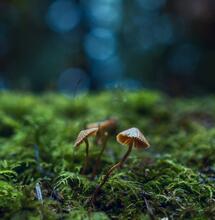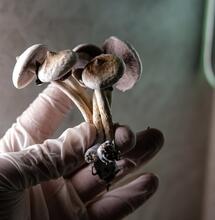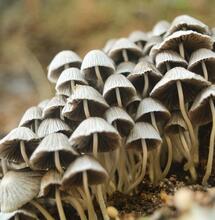The King of Mushrooms

With research into the potential of many types of psychoactive "magic mushrooms" opening back up for the first time in years, The beneficial properties of "Funghi" are firmly back in the spotlight as a new "super-plant". Whilst we await the outcome of what could be years of research, there are plenty of legal varieties of mushrooms that have been used for "wellness" for thousands of years that we can try.
Reishi mushrooms are grown commercially and sold in various formats, including tea, tinctures, capsules, and even hot cocoa, beauty products, and energy bars. For thousands of years, these fan-shaped, orange/reddish brown mushrooms were a rare, natural find and delicacy reserved for royalty in many Asian cultures.
Reishi mushrooms have been celebrated in these cultures for generations due to the large array of qualities that they are believed to possess.
Here are ten potential benefits that have been discovered.
1. Rich in antioxidants: Nicknamed "the mushroom of immortality," reishi mushrooms have antioxidant properties that are great for overall health as well as reducing the risk of disease and premature ageing.
2. May lower blood pressure: There is limited evidence from a research study conducted in 2014 that the compounds in reishi mushrooms may help keep high blood pressure at bay.
3. May lower cholesterol: The triterpenes and beta-glucans in reishi mushrooms may help reduce high cholesterol levels.
4. Immune system booster: The mushroom's beta-glucans (complex sugars) are believed to stimulate the immune system to prevent infection. In Asian cultures, they have even been used as an immunostimulant for patients with HIV and cancer.
5. Alleviate fatigue: Reishi mushrooms are adaptogens, plants that help the body combat stress. In one study of patients suffering from physical and mental exhaustion, consumption of a compound found in reishi mushrooms improved aches, pains, and feelings of irritability.
6. May offer neural protection: Research studies on animals revealed that reishi mushrooms could be therapeutic for neurodegenerative disorders such as Alzheimer's disease and may also protect the brain from seizures.
7. May relieve allergy symptoms and Asthma: Reishi mushrooms may have antihistamine effects that improve the body's oxygen supply and help those who suffer from chronic and allergic asthma.
8. May be helpful for people with diabetes: Through the results of one clinical study, reishi mushrooms may decrease blood sugar by inhibiting the enzyme that produces glucose. Additionally, it has been noted that taking reishi mushrooms could also reduce kidney stress, meaning that there may be the possibility that reishi can prevent, slow down or stop kidney complications in diabetes patients.
9. May improve liver function: A study on mice found that Reishi mushroom spores could promote liver cell regeneration. This means that they enhanced the liver's ability to help flush toxins out of the body.
10. May help fight cancer: Researchers believe that the complex sugars present in the mushrooms may prevent new blood vessel growth. This could help shrink tumours as cancer cells need a steady blood supply to grow. The essential oils in reishi mushrooms may also help inhibit the development and metastasis of tumours. Other research suggests that reishi mushrooms could also help alleviate chemotherapy-induced nausea and improve the efficacy of radiation therapy.
While reishi mushrooms are generally considered safe for most people to take, like most medicines and health supplements, there is a possibility of some side effects. So you should always consult with your doctor before taking them.






